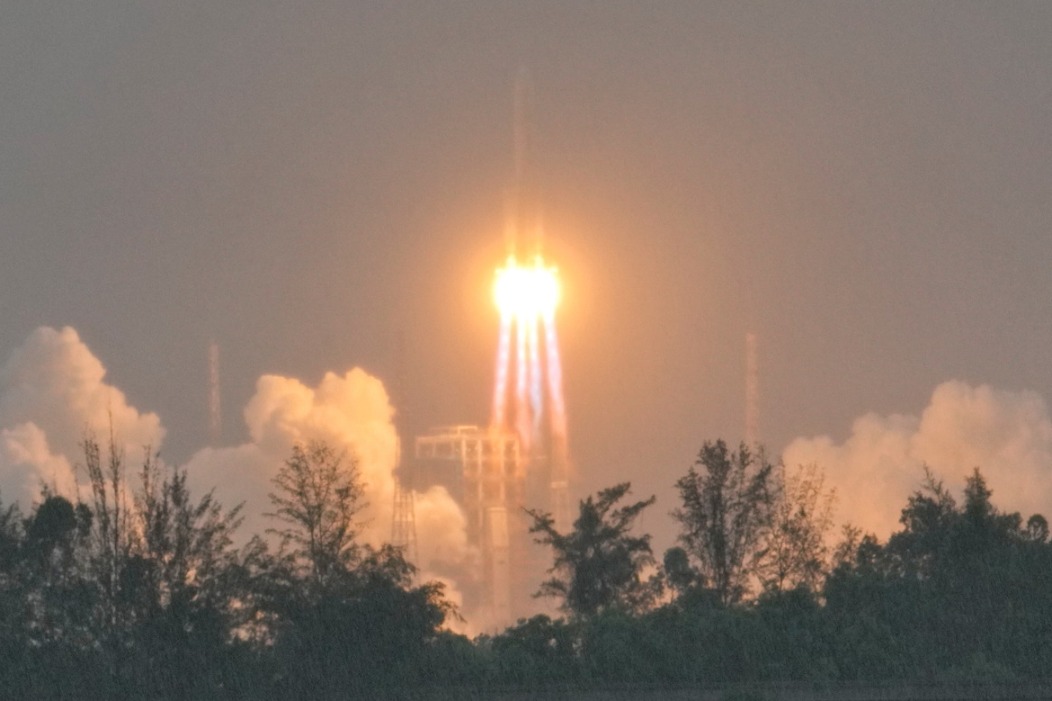US shares up despite China trade dispute
By SCOTT REEVES in New York | China Daily | Updated: 2020-01-02 10:18

Analysts differ over whether bull run on Wall Street will continue in 2020
The US stock market reached record highs in 2019 despite uncertainty created by the ongoing trade dispute with China and a temporary inversion of the bond yield curve that often signals a coming recession.
The Dow Jones Industrial Average, the Nasdaq Composite and the S&P 500 indicators rose after the US Federal Reserve, or Fed, cut interest rates by a quarter of a percentage point three times during the year.
Lower interest rates mean lower borrowing costs-and that's good for businesses planning to expand and for consumers buying on credit. Retail spending represents about two-thirds of the US economy.
Through Monday, the Dow was up in 2019 by about 22 percent, the Nasdaq about 35 percent and the S&P 500 by about 29 percent. The market started 2019 in a hole after a two-month sell-off at the end of 2018.
"What a year for the stock market," Matthew Maley, chief market strategist for Miller Tabak, wrote in a research note. "One reason why the consensus believes the stock market can hold up next year has to do with the belief that interest rates will remain low."
But earlier in the year, the market was volatile as US President Donald Trump's tweets increased uncertainty. On Aug 23, Trump tweeted "We don't need China, and frankly, would be far better off without them."
He followed with tweets critical of Fed Chairman Jerome Powell. Within 15 minutes, the Dow had plunged about 400 points and had lost a total of about 500 points within an hour. The drop cost investors about $500 billion.
Overall, the $21 trillion US economy remained strong as evidenced by record low unemployment, steady wage growth and strong consumer spending.
The market rallied after Trump's tweets because many investors saw lower stock prices as a buying opportunity. The agreement between the US and China on phase one of a trade deal on Dec 13 also boosted optimism.
In company news, Boeing's continuing problems with its best-selling jet, the 737 Max, initially hammered its stock price.
In October, Boeing reported a 51 percent drop in its third-quarter profit as revenue fell following crashes of two Max airliners that killed a total of 346 passengers and crew. But investors believe the problems with the plane's automated anti-stall device blamed for the crashes can be fixed and stayed with the stock, even though the Max crisis eventually cost CEO Dennis Muilenburg his job on Dec 23.
Boeing represents about 5 percent of US exports, and its stock is one of 30 tracked daily to compile the Dow Jones Industrial Average.
There have been nine major recessions since 1950, and all have been preceded by an inversion of the yield curve.
When the curve is inverted, short-term Treasury bonds pay more interest than long-term notes, underscoring doubts about future growth. The warning reversed in November, easing immediate fears of an economic slowdown, as employment and wages continued to rise.
IPOs caution
For many investors, the 2019 strategy was simple: Buy just about everything, especially technology stocks, but avoid overhyped initial public offerings, or IPOs.
Ride-hailing companies Lyft and Uber Technologies offered the potential to upend the conventional taxi business and perhaps car ownership in urban areas, but each came with steep losses.
WeWork, a provider of shared office space for small-to-medium-sized businesses and perhaps the most highly touted IPO of the year, ditched its plans as doubts grew despite being valued at $47 billion.
Investors concluded that the company expanded rapidly at great expense and that losses would continue long into the future because there was no clear path to profitability.
But IPOs from less-flashy companies with a clear path to profitability thrived in the market, including Chewy, an online retailer of pet food and other pet-related products, and Tradeweb Markets, an international financial services company.
Cutting interest rates stimulated the economy and boosted stock prices, suggesting a strong market ahead. But some analysts warn that FOMO-fear of missing out-artificially drives stock prices upward and may indicate a market top in the months ahead.
Mike Wilson, an analyst at New York investment bank Morgan Stanley, believes the market will decline about 4.5 percent this year, but US economic growth will stabilize below 2 percent as labor costs rise in a tight job market.
"Trade, the election and a late-cycle economy keep the market searching for new leadership amid high uncertainty," he said in a research note to investors. "We expect the market to vacillate between a pro-cyclical outcome and a defensive one as data comes in and trade tensions and the election evolve."
In a note to investors, Franklin Templeton, a global investment firm based in New York, advised: "Although uncertainties remain, our senior investment leaders have a cautiously optimistic outlook for 2020. They still do not see a global recession looming and believe there are plenty of reasons to remain invested. However, they also stress it's important to be selective, amid a changing market landscape."
























